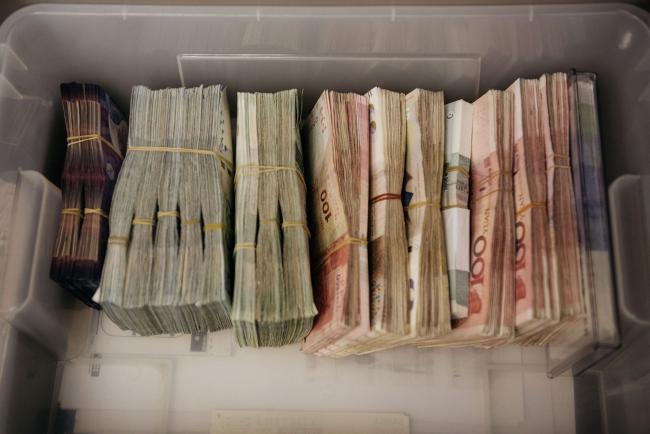
(Bloomberg) — The Trump administration is going ahead with controversial new rules that would clear the way for the U.S. to start applying punitive tariffs on goods from countries accused of having undervalued currencies, the Commerce Department said Monday.
The move would give new muscle to U.S. complaints about currency manipulation that have in the past targeted economies like China and Japan and thus turn the more than $6 trillion-a-day global currency market into a new battlefield in the Trump administration’s trade wars.
It would allow the U.S. to impose countervailing duties on goods from countries accused of manipulating their currencies, even in cases where they were not officially found to be guilty of that by the U.S. Treasury. Past administrations have resisted calls to take such action from Congress and some industries for fear it would lead to tit-for-tat currency wars.
In the wake of the global financial crisis a decade ago, policy makers in countries such as Brazil accused the U.S. and the Federal Reserve of using monetary policy to weaken the dollar to help spur a quicker recovery in the U.S.
Currency Manipulation
President Donald Trump has long accused China and other countries of doing the same. Commerce Department officials on Monday presented its decision as a delivery of a 2016 campaign promise to tackle currency manipulation around the world.
“This Currency Rule is an important step in ensuring that unfair trade practices are properly remedied,” said Secretary of Commerce Wilbur Ross in a statement. “While successive administrations have balked at countervailing foreign currency subsidies, the Trump Administration is taking action to level the playing field for American businesses and workers.”
The new rule, which was opposed by the Treasury Department when it was first proposed in May 2019, would allow U.S. companies to file complaints with the Commerce Department over specific imported products by treating undervalued currencies as a form of unfair subsidy. It would also give the administration the power to self-initiate cases should it so choose, however, potentially making the U.S. government plaintiff, judge, jury and executioner in currency fights.
A Treasury spokeswoman did not immediately reply to request for comment.
The Commerce Department put some caveats on its powers, saying it would “not normally include monetary and related credit policy of an independent central bank or monetary authority” in determining whether foreign governments had acted inappropriately to weaken currencies. “Commerce will seek and generally defer to Treasury’s expertise in currency matters,” it said.
‘Broad Signal’
But its statement left room for unilateral action by Commerce — even if Treasury, which issues a twice-yearly report identifying currencies that are artificially weak or the subject of government manipulation, determines that a currency is not undervalued.
“This appears intended as a broad signal to U.S. trading partner countries that any significant weakening of their currencies relative to the dollar could invite retaliatory actions,” said Eswar Prasad, a Cornell University economist and the author of books on the rise of the dollar and Chinese renminbi.
The new rule appeared to go against guidance from a Treasury official, who said last June that the framework of any currency assessments by Commerce would be consistent with its semi-annual foreign-exchange report to Congress.In a question and answer section attached to Monday’s announcement, the Commerce Department said it would preserve the final power to make any determination about whether a currency’s value presented an unfair subsidy for that country’s exporters. The statutes governing Treasury’s mandate to monitor currencies and Commerce’s power to impose anti-subsidy duties had different criteria, Commerce said.
“Hence, the two processes may result in different outcomes as to a particular country, theoretically including the possibility of applying countervailing duties to a country that does not meet the criteria for designation under the laws Treasury administers,” the statement said.Commerce also said the new rule would allow it to specifically impose currency-related tariffs against China even if Treasury did not label it a currency manipulator. The Treasury last month lifted a designation of China as a manipulator just days before Trump signed a “phase one” trade deal with China that includes language on currencies, though the new rule appears to give the U.S. powers to act that go beyond that included in last month’s deal.
The final rule announced Monday drew concern from some former U.S. officials.
“This is a unilateral policy which will alienate countries around the world,” said Mark Sobel, a former Treasury official. It may also violate the U.S.’s World Trade Organization commitments, Sobel said, although the Commerce Department insisted in its statement that “there is no WTO rule that bars the imposition of countervailing duties on subsidies conferred through currency practices.”
It also prompted warnings that the rule marked another step in Trump’s efforts to weaponize the dollar after he previously set out to talk down its value and blame the Federal Reserve for causing it to strengthen, to the detriment of U.S. manufacturers and other exporters.
The new rule set vague enough criteria for determining a currency’s proper value that it would allow the U.S. to easily take action if it so chose, Prasad said.
”While not explicitly articulating a weak dollar policy, the Trump administration seems to be signaling that it will take steps to offset any strengthening of the dollar relative to the currencies of its trading partners,” he said.


